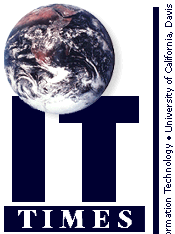

DATA SMOG:
Surviving the Information Glut
by David ShenkPublished by HarperEdge, 1997
Reviewed by Nancy Harrington
These days it's easy to feel overwhelmed by the need to make decisions and fulfill responsibilities in both our work and personal lives; so much to worry about, so little time! Even our own campus has a special task force focusing on staff workload issues that most of us are all too aware of. In his book, Data Smog, David Shenk, media scholar and Internet enthusiast, suggests that our environment is polluted with too much data — data generated by technology. He sets about describing to us the connection between data escalation and a variety of social and physical ills, including attention deficit disorder, loss of civility, lack of privacy, and even road rage.

Shenk includes both anecdotal and statistical citations about unanticipated effects of some technologies. In one example, a woman's fax machine worked too well. She began to notice that "it transmitted information across the country and world so quickly, ... becoming a kind of taskmaster that insisted on faster and faster work," reminiscent of Charlie Chaplin's movie, Modern Times. Now, of course, fax transmission seems hardly zippy at all compared to the rate at which information traverses the Internet. But consider how many of us grow irritable waiting the few moments it takes our lunch to heat in the microwave, or for the light to turn from red to green.
While much of Shenk's book focuses on information and its relation to politics, government, and journalism, a small portion does address effects of too much data in the workplace. "In the office, an average of 60 percent of each person's time is now spent processing documents," Shenk states. "Two-thirds of business managers surveyed report tension with colleagues, loss of job satisfaction, and strained personal relationships as a result of information overload." Shenk fails to provide comparative statistics from, say, ten years ago that would help support his contentions. Nevertheless, many of the phenomena he describes are likely to sound familiar to any of us:
- Fewer and fewer silent moments as the media become pervasive — TVs in shopping malls, pagers in movie theaters (reminding me of my own experience in line at the post office when the customer at the counter kept the postal worker waiting in order to take a call on her cell phone).
- A correlation between higher levels of sensory inputs and decreased willingness to help strangers (goodbye, Good Samaritan!).
- A correlation between higher levels of information and people's increased confidence in their judgments... with no corresponding increase in accuracy.
Does Shenk offer us any solutions to these difficulties? Indeed, he suggests four general antidotes to data smog:
- Be your own filter: Turn off the TV, avoid "news-nuggets," leave the pager and cell-phone behind, get off junk mail lists (Shenk tells you how on page 223). These actions can help you regain control over the pace of your life.
- Be your own editor: Limit your own output of data, avoid sending frivolous email. We should "be more economical about what we say, write, publish, broadcast, and post online." Limiting the information we need to sort through can result in greater civility as "people feel less need to be sensational to attract attention."
- Simplify: Think about which technologies you really need and embrace the simplest ones that can get the job done. Choose those "tools whose function anyone can plainly understand."
- De-nichify: Read general interest magazines, avoid specialized jargon.
Still, books of the genre that examine the unintended and sometimes unnoticed consequences of technologies (Postman's Technopoly, Stoll's Silicon Snake Oil) generally do contain thought-provoking notions and provide some measure of balance to our growing love affair with data. This book is no different. It's an easy and interesting read, especially for anyone who hasn't thought about the topic until now.
Nancy Harrington is Human Resources Coordinator for the Division of Information Technology.